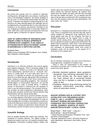 30 citations,
May 2016 in “Expert Opinion on Biological Therapy”
30 citations,
May 2016 in “Expert Opinion on Biological Therapy” New treatments targeting immune pathways show promise for severe hair loss but need more research for safety and effectiveness.
 9 citations,
April 2018 in “Journal of trace elements in medicine and biology”
9 citations,
April 2018 in “Journal of trace elements in medicine and biology” Hair analysis can show nutritional status and environmental exposure, with phosphorus being very stable in hair and differences found based on gender and conditions like depression and autism.
[object Object]  4 citations,
May 2019 in “The World Journal of Men's Health”
4 citations,
May 2019 in “The World Journal of Men's Health” Taking 5 alpha reductase inhibitor medication slightly increases the risk of depression, especially as you get older.
 2 citations,
October 2023 in “Dermatology and therapy”
2 citations,
October 2023 in “Dermatology and therapy” Alopecia areata severely impacts quality of life, causing anxiety, depression, and work impairment.
 2 citations,
March 2020 in “Cns & Neurological Disorders-drug Targets”
2 citations,
March 2020 in “Cns & Neurological Disorders-drug Targets” Lurasidone is effective for bipolar depression and schizophrenia, but more safety data is needed.
 1 citations,
January 2002 in “Dermatology + psychosomatics”
1 citations,
January 2002 in “Dermatology + psychosomatics” Most people worried about abnormal hair loss actually have psychological issues like depression or anxiety.
Proper nutrition and vitamins can boost the immune system and overall health in older adults.
 December 2022 in “The Indian journal of chest diseases & allied sciences”
December 2022 in “The Indian journal of chest diseases & allied sciences” Women with PCOS often have sleep problems, including sleep apnea, which are linked to obesity and depression.
 66 citations,
March 2018 in “British journal of dermatology/British journal of dermatology, Supplement”
66 citations,
March 2018 in “British journal of dermatology/British journal of dermatology, Supplement” An imbalance between certain immune cells is linked to a chronic skin condition and may be influenced by obesity, smoking, and autoimmune issues.
 January 2020 in “Journal of quality in health care & economics”
January 2020 in “Journal of quality in health care & economics” Most women with depression in the study had low vitamin D levels.
 January 1989 in “Side effects of drugs annual”
January 1989 in “Side effects of drugs annual” Some cancer and immune system drugs can cause serious side effects, including heart, lung, nerve, and organ damage, which need careful monitoring and management.
 8 citations,
December 2021 in “International Journal of Family Studies, Food Science and Nutrition Health”
8 citations,
December 2021 in “International Journal of Family Studies, Food Science and Nutrition Health” Extra virgin olive oil may boost the immune system and help fight infections like COVID-19.
 37 citations,
September 2018 in “Psychoneuroendocrinology”
37 citations,
September 2018 in “Psychoneuroendocrinology” Finasteride treatment in male rats causes long-lasting effects on depression-like behavior, brain cell growth, inflammation, and gut bacteria composition.
 34 citations,
October 2011 in “Pathology Research International”
34 citations,
October 2011 in “Pathology Research International” Behçet's Disease may be caused by genetic and environmental factors leading to abnormal immune responses, and stress management and new treatments could improve patient outcomes.
 10 citations,
January 2017 in “Skin Pharmacology and Physiology”
10 citations,
January 2017 in “Skin Pharmacology and Physiology” Finasteride may cause vitiligo, sexual issues, and depression; better treatments and predicting side effects needed.
 50 citations,
March 2000 in “American Journal of Clinical Dermatology”
50 citations,
March 2000 in “American Journal of Clinical Dermatology” Alopecia Areata has no guaranteed treatment for hair regrowth, but options like corticosteroids and minoxidil are used, with future research focusing on genetic and immune therapies.
 3 citations,
January 2008 in “Journal of the American Academy of Dermatology”
3 citations,
January 2008 in “Journal of the American Academy of Dermatology” A patient's skin rash did not affect the area where a previous viral rash was healing, suggesting a rare immune response.
 2 citations,
November 2011 in “Journal of Infection”
2 citations,
November 2011 in “Journal of Infection” A woman with asthma improved from a severe fungal infection after treatment change, and most HIV-positive women in a UK study had low immune cell counts but were responding well to treatment.
 January 2007 in “Journal of The American Academy of Dermatology”
January 2007 in “Journal of The American Academy of Dermatology” Propylthiouracil, a thyroid medication, can cause skin blood clots and immune-related blood vessel inflammation.
 60 citations,
September 2015 in “Expert Review of Clinical Immunology”
60 citations,
September 2015 in “Expert Review of Clinical Immunology” Lymphocytes, especially CD8+ T cells, play a key role in causing alopecia areata, and targeting them may lead to new treatments.
 56 citations,
January 2021 in “Clinical and Experimental Medicine”
56 citations,
January 2021 in “Clinical and Experimental Medicine” The document concludes that while there are various treatments for Alopecia Areata, there is no cure, and individualized treatment plans are essential due to varying effectiveness.
5 citations,
June 2012 in “Journal of Investigative Dermatology” A new mouse model for vitiligo helps study immune responses and potential treatments.
 December 2024 in “International Journal of Health Sciences and Research”
December 2024 in “International Journal of Health Sciences and Research” Vitamin D is crucial for health, and deficiency can cause hair loss and other health issues.
 August 2024 in “Frontiers in Public Health”
August 2024 in “Frontiers in Public Health” Alopecia Areata severely impacts mental health, causing anxiety and depression, affecting quality of life.
 April 2023 in “Medizinische Genetik”
April 2023 in “Medizinische Genetik” New research has found 14 genes linked to the risk of developing alopecia areata, improving understanding and treatment options.
 January 2023 in “Research Square (Research Square)”
January 2023 in “Research Square (Research Square)” Hair cortisol may be a good indicator of recent mood in people with bipolar disorder.
 391 citations,
January 2010 in “Journal of The American Academy of Dermatology”
391 citations,
January 2010 in “Journal of The American Academy of Dermatology” Half of people with Alopecia Areata may see hair regrowth within a year without treatment, but recovery is unpredictable.
 148 citations,
December 2018 in “Journal of autoimmunity”
148 citations,
December 2018 in “Journal of autoimmunity” Alopecia areata is an autoimmune disease causing patchy hair loss, often with other autoimmune disorders, but its exact causes are unknown.
 122 citations,
November 1984 in “Journal of the American Academy of Dermatology”
122 citations,
November 1984 in “Journal of the American Academy of Dermatology” No single treatment is consistently effective for alopecia areata, and more research is needed.
[object Object]  120 citations,
November 2014 in “Biological Reviews”
120 citations,
November 2014 in “Biological Reviews” The telogen phase of hair growth is active and important for preparing hair follicles for regeneration, not just a resting stage.




























